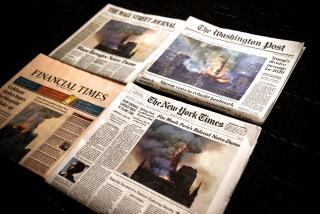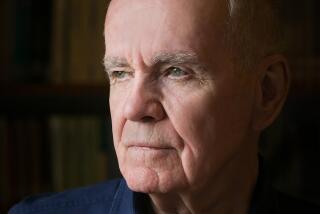Editor helped shape prominent writers’ work
- Share via
Ted Solotaroff, a writer, critic and editor who founded New American Review, an influential literary journal in the 1960s and ‘70s, and who helped shape the works of prominent writers while at Harper & Row publishers, died Aug. 8 at his home in East Quogue, N.Y., of complications from pneumonia. He was 79.
A “man of letters” in the tradition of Edmund Wilson, Alfred Kazin and Lionel Trilling, Solotaroff was “one of the last of the great editors,” said novelist and short-story writer Bobbie Ann Mason, who worked with Solotaroff on her first novel, “In Country” (1986).
Solotaroff was an editor and critic at the opinion journal Commentary before starting New American Review in 1967. The paperback literary journal, later called American Review, published E.L. Doctorow, Gabriel Garcia Marquez, William H. Gass and Donald Barthelme, among others. He also ran an early excerpt from what became Philip Roth’s novel “Portnoy’s Complaint.”
“Ted Solotaroff’s taste in fiction has proved to be something of a national resource,” author John Romano wrote in a 1978 issue of the New York Times Book Review, shortly before American Review ceased publication.
“It was the great regret of his life that he didn’t push harder to keep it going,” said his son Paul Solotaroff. He said Bantam, which funded the magazine, “was pushing hard to shut it down. It wasn’t bringing in the novels that would grow out of these pieces being published in the journal.”
Theodore Solotaroff was born Oct. 9, 1928, into a working-class Jewish family in Elizabeth, N.J. His father, the owner of Ben’s Standard Plate Glass Co., was a difficult man who represented, as Solotaroff wrote, “that sort of driving energy that established the Jewish middle class.”
As a University of Michigan freshman, the first story Solotaroff ever wrote won a campus fiction prize. He earned his undergraduate degree in 1952 and then became a graduate student at the University of Chicago, where he befriended aspiring novelist Philip Roth, also a New Jersey native with Jewish working-class roots.
Solotaroff’s growing awareness of his friend’s prodigious talent -- even as a graduate student -- extinguished his own long-nurtured aspirations to write fiction.
“The difference,” he wrote in “First Loves,” “wasn’t a matter of mode or taste: It seemed simply, starkly, that of ability, like the difference between an actor who can play any role . . . and one who can’t.”
He earned his master’s at the University of Chicago in 1956 and began to build his own literary career, first at Commentary from 1960 to 1966 and then at his own magazine.
At Harper & Row, where he was senior editor from 1979 to 1991, he edited Russell Banks, Sue Miller, Robert Bly and others.
Mason said it took her several months to realize that the novel she was contemplating was about Vietnam. “He encouraged me to confront the subject and not sidestep it,” she said.
In 1989, when Rupert Murdoch bought Harper & Row, Solotaroff began to do less editing and more writing.
He left the book business with a parting shot at what he labeled “the literary-industrial complex.”
Book publishing, he wrote in a 1987 issue of the New Republic magazine, “has largely sold out its cultural purpose to a commercial one, thereby losing the vision and the energy and the realism that guided and empowered publishers like Knopf, Cerf . . . and others.”
He found some satisfaction in the fact that his own pension tripled in value because the bidding war between Murdoch and fellow media magnate Robert Maxwell propelled the stock upward.
His marriages to Lynn Friedman, Shirley Fingerhood and Ghislaine Boulanger ended in divorce.
Survivors include his wife of 28 years, Virginia Heiserman Solotaroff of East Quogue; four sons from his first three marriages; five stepchildren; a brother; and 13 grandchildren.
More to Read
Sign up for our Book Club newsletter
Get the latest news, events and more from the Los Angeles Times Book Club, and help us get L.A. reading and talking.
You may occasionally receive promotional content from the Los Angeles Times.






